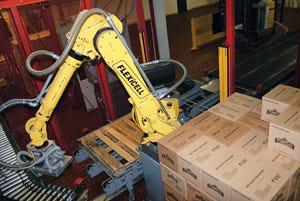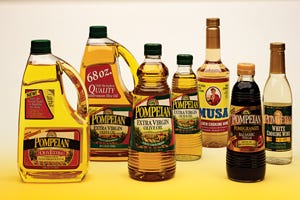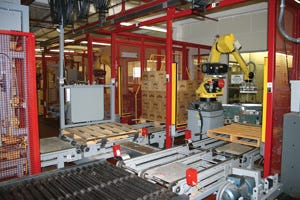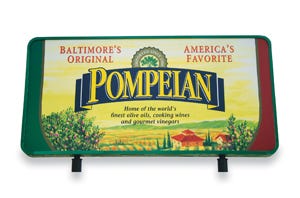March 11, 2015
|
A robot is one of the four cells layers shipping cases of olive oil on one of its two pallet loading positions above. |
Pompeian, Inc., a leading importer, bottler and distributor of olive oils and wine vinegars in the U.S., is changing the way it does business, at least the way it packs cases of its familiar product at its headquarters in Baltimore.
For the first time, the 102-year-old company has automated its olive oil and wine vinegar processing/bottling lines with robotics.
This may not sound earth-shattering to most, but everything about Pompeian is steeped in tradition. Baltimore's original olive oil importer, Pompeian became the first brand of olive oil nationally introduced in the U.S. By monitoring the growing, harvesting and pressing of the olives and controlling the handling, shipping, storing and packing of the olive oil, as well as several varieties of vinegar—including a new, pomegranate-infused balsamic vinegar—and cooking wine, extra virgin olive oil/canola oil blends as well as prepared olives and artichoke hearts, Pompeian soon became an industry leader.
Distinguished on store shelves by its patented, tapered, ribbed bottles, Pompeian is now the fastest growing major olive oil brand, the top selling red wine vinegar and the fastest growing cooking wine brand in America (according to Information Resources Inc., 2005). The future looks bright olive green for Pompeian.
|
Pompeian's 136 different products are available in a variety of containers, from 2-oz. |
“We're also the fastest-growing national brand of olive oil in the category,” says Kevin Lydon, vp of operations. All of its recent product introductions and increasing production volumes in a historic brick inner-city building were causing the company's century-year-old facility to feel some growing pains. Until June 2007, the cases of olive oil and other products at the plant were hand-palletized and wrapped, resulting in low palletizing rates and higher manual labor costs than Pompeian would have liked. “Before, four individuals used to manually stack between 3,500 and 4,000 cases each ten-hour day on pallets,” Lydon recalls.
With an expanding mix of stockkeeping units and packaging configurations, Pompeian realized it required faster and more flexible palletizing. The packaging group knew that not only automating the setup was the answer, but going robotic was the logical choice. Robotic palletizing promised increased capacity, decreased labor, reduced maintenance costs and downtime, and a safer work environment while Pompeian could get the versatility required for its diverse line of products.
It called upon robotic systems integrator Flexicell, Inc. (www.flexicell.com) to design and provide a robotic palletizing system for its shipping cases of oils, vinegars and other products that could take Pompeian from the past efficiently into the future.
“We desired repeatability and uptime performance, flexibility, the ability to handle ever-changing pallet patterns and new packaging structures and ease of use, as this was our first use of robotics,” explains Lydon. “We couldn't afford a long learning curve or any extra downtime.”
On to the future
From a streetside view, no one would guess that the charming, turn-of-the-century plant contains such a sophisticated, 21st-century robotic system and the whole concept of robots may seem somewhat out of place at the 160,000-sq-ft facility rich with tradition. But adding robotic palletizing provided Pompeian an opportunity to reduce its labor costs, boost production efficiency and improve ergonomics. “Floorspace and ceiling height were an issue, and we had to add additional support under the floor,” Lydon says.
Pompeian's 136 different products are available in a variety of containers, from 2-oz bottles to one-gal metal tins. Especially popular are its 16- and 32-oz glass and vinyl bottles for olive oil in a patented, tapered, ribbed bottle design, as well as 125- and 750-mL glass and polyethylene bottles for White and Golden cooking wines, 48- and 64-oz sizes of handled, vinyl jugs and hefty, 1-gal metal F-style tins.
The company's case-packing, logistics and material-handling solutions had to step up in order to keep pace with demand.
“We pack more than ten different case sizes on some of the lines, so the robots were designed to handle six or seven different pack patterns and fifteen to twenty-one different products,” says Lydon. The maximum weight of a pallet load is about 2,250 lb, he says.
Flexicell created a multiple-robot palletizing and stretch-wrapping system to accommodate Pompeian's four bottling lines for olive oil, vinegars and Marsala and Sherry cooking wines and their corresponding corrugated shipping cases.
Integrated into the historic building were four palletizing cells featuring Fanuc Robotics' (www.fanucrobotics.com) M710iC/50 six-axis palletizing robots, chosen especially for Pompeian's application for their flexibility, speed and reach. Each of the robots incorporates Fanuc's R-J3iC controller and a hand-held I pendant operator-communication tool that function with Fanuc's Handling Tool software. At Pompeian, the robots can handle cases weighing up to 37 lb.
Each of the cells is capable of palletizing loads from one production line to one of two loading positions.
Flexicell also equipped the cells with its in-house-built safety guarding, SmartScan (+44 0 15326 401313) safety light fences, custom-designed and built end-of-arm tooling, a pallet conveyor and an automatic empty-pallet dispenser at the front of the station capable of holding up to 20 pallets, dispensing one pallet at a time.
|
Depending on case size and products palletized, loads range from 70 to 216 cases/pallet. |
The system was also custom-programmed by Flexicell, which used Rockwell Automation's (www.rockwellautomation.com) Allen-Bradley CompactLogix programmable logic controller and Fanuc's Handling Tool software. The robotic cells are coupled with Hytrol (www.hytrol.com) E-Z Logic infeed conveyors that transport the shipping cases filled with product to the cells from existing case-packing equipment.
Empty 48x40-in. pallets and full pallet loads are transported throughout the system using a Flexicell-built, multi-function pallet-transfer cart that runs back and forth on a 105-ft-long rail embedded into the new brick and concrete floor that was added to the area to complement the plant's old-world, historic esthetics. The motor-driven cart shuttles the palletized loads of cases to a Wulftec (www.wulftec.com) Model WCA-150 automatic pallet stretch wrapper.
“We're very pleased that Flexicell recommended a Wulftec stretch wrapper,” Lydon tells PD. “The machine has worked flawlessly since the installation.”
Four loads at a time
Adding all of this new equipment into the historic building could have been a challenge, but it was business as usual for Flexicell. Along with the new equipment, Pompeian installed a steel-reinforced red-brick production floor in the area to maintain visual esthetics and to ensure support for the robots, Lydon notes.
Lydon and Flexicell's regional sales manager Jack Peters teamed up to head a team that includes Fanuc, Wulftec and Hytrol to develop the end-of-line palletizing cell system with the performance and flexibility to handle Pompeian's many stockkeeping units packed at speeds from 9 to 27 cases/min, depending on the specific packing line and the end-of-arm gripper tool being used.
Brains rather than brawn
With fewer operators, the lines run as many as six days a week and can handle Pompeian's various case sizes and packing patterns, palletizing four loads at once. Each line is dedicated to running certain package sizes and product types. There are two oil lines, one vingear line and one cooking-wine line.
“Labor costs have been reduced, and we now utilize the operators to run another line, so we increased capacity rather than eliminated head count,” Lydon says.
“This system has provided flexbility in ways we didn't completely foresee when we began the project,” he observes. “Our operators are able to reduce the stress and strain on their bodies, and we are able to utilize their intelligence instead of their brawn. We're increasing productivity, which jumped twenty-seven percent on our production lines after the equipment installation.”
|
Being that the pallets are stretch-wrapped before they leave the area has also reduced warehouse damage by 85 percent, he adds, and saves an hour's time loading trucks. “Overall, we are extremely pleased with the addition of this equipment,” he points out.
In production, filled, sealed shipping cases are transported to the palletizing area on four separate Hytrol E-Z Logic zero-pressure buffering conveyors. Reference pushers ease the cases against a guide to accurately align them into position in a cell before the robot begins picking them up.
Able to grasp either one or two cases at a time, each robot has custom end-of-arm tooling that Flexicell designed with vacuum grippers powered by an electrical vacuum pump from Busch (www.buschpump.com) and places the cases onto a pallet placed on each side of the robot, layering the cases according to the pack pattern designed for that specific product load.
When the pallet is full of cases, the robot sends a signal to the transfer cart to come to the cell and pick up the load.
The cart has two pallet positions or spaces (one side for an empty pallet; one side for a full load to be accepted from the cell), and indexes the full load to a discharge point at the stretch wrapper's conveyor infeed using chain conveyors.
As a full load waits for the transfer cart or is being discharged to the cart, the robot, meanwhile, continues palletizing because the cell is designed for loading in either of the two positions. The maximum number of cases it layers per load is eight; the maximum amount of cases per layer is 30.
Says Peters, “Each cell has two pallet-loading stations so that the robots don't have to stop [operating].”
The cart moves the full pallet load to the turntable stretch-wrapper's conveyor infeed before the load is securely film-wrapped. At this position, the cart simultaneously receives an empty pallet from the pallet dispenser located parallel to the stretch wrapper. As full pallets are wrapped, the cart continues on its programmed path down the rail to repeat the proccess at another cell.
The transfer cart uses ultrasonic sensors from Omron's STI Ultrasonics (www.sti.com) that halt the cart if it gets too close to an object or a person. Other sensors on the line include photocells from Banner Eng. (www.bannerengineering.com), protected by steel bunkers to prevent damage and misalignment.
“The rails are embedded in the brick flooring,” explains Peters. “This allows forktrucks and foot traffic to move easily over them.” Depending on the case sizes and the products being palletized, the loads range from containing 70 cases to 216 per pallet.
'Oils' well that ends well
The entire palletizing/case-handling system was designed, constructed, assembled, tested, installed and delivered in less than six months. The cells operate 10 hours/day and four days/week.
“We couldn't have asked for a better startup,” says Lydon. “We're already seeing a payback.” This is just the first step in Pompeian's overall plant modernization plan, he sums up. “We're expanding our warehouse, increasing production rates and adding a state-of-the-art, large-volume filling line. Flexicell did a fantastic job. We would only use Flexicell Robotic Solutions for our future projects.”
More information is available: |
Flexicell Robotic Solutions, Inc., 804/550-7300. www.flexicell.com. |
Banner Eng., 800/809-7043. www.bannerengineering.com. |
Busch LLC, 800/872-7867. www.buschpump.com. |
Fanuc Robotics, 800/477-6368. www.fanucrobotics.com. |
Hytrol Conveyor Co., Inc., 870/935-3700. www.hytrol.com. |
Rockwell Automation, 414/382-2000. www.rockwellautomation.com. |
SmartScan Ltd., 44 0 15326 401313. |
Omron Scientific Technologies/STI Ultra Sonics, 888-510-4357. www.sti.com. |
Wulftec, Intl., 877/985-3832. www.wulftec.com. |
About the Author(s)
You May Also Like






